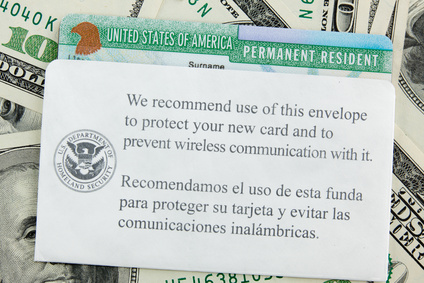After Becoming a Permanent Resident
After receiving lawful permanent resident (LPR) status, LPRs should understand their rights, how to maintain status and how to comply with various legal requirements.

Conditional Permanent Residency
If LPR status was obtained through marriage to a U.S. citizen or through an EB-5 investment, the residency may be conditional. LPR status will expire in two years unless the LPR applies for the condition to be removed within 90 days preceding the expiration date.
Rights and Responsibilities
LPRs essentially have the same rights as American citizens, with a few exceptions. Except for a few local elections, LPRs are not permitted to vote. Also, LPRs can be deported if they commit a crime. LPRs are also expected to pay taxes. Additionally, LPR males between 18 and 25 years of age are required to register with the Selective Service. Failure to register is a ground for denying naturalization, in addition to other penalties.
Traveling
LPRs do not need a separate visa to enter the United States in most circumstances. They can enter the United States with an unexpired I-551 stamp in their passport and their green card. If an LPR is going to be outside the United States for between one to two years he or she will probably need to apply for a reentry permit.
Abandoning LPR Status
Many LPRs have a hard time maintaining their status when they are outside the United States for extended periods of time. LPRs need to be very careful about losing their status as a result of being outside the United States for too long.
Naturalization
To become U.S. citizens, LPRs must undergo the naturalization process. They must meet various residency requirements, such as maintaining their permanent residency for five years (three years if the LPR is married to a U.S. citizen). The LPR also needs to be in the United States for half of this time period. The LPR cannot spend substantial periods of time outside the United States that would show a failure to maintain continuous residency. If an LPR spends more than six months outside the United States on any trip, he or she risks not being able to naturalize.
The Green Card
Currently issued green cards are not actually green. The first cards in the 1950s were green, and the name stuck. The I-551 stamp in an LPR’s passport has the same legal meaning as the LPR card, but the stamp must be renewed after a year, and the card must be renewed after two years if it is conditional card or 10 years if it is not conditional. An LPR does not lose his or her status if the card or stamp expires, but he or she will lack any legal proof of status, so it is best to file for an extension in a timely manner. Note also that either the stamp or the green card is acceptable proof of employment authorization and can be used as well to apply for a Social Security Card or driver’s license.
Sponsoring Family Members for Immigration
As permanent residents, LPRs are entitled to sponsor spouses and unmarried children for LPR status. However, unless the relationship existed prior to becoming an LPR, it could be a very long wait.
Change of Address
LPRs are required to notify U.S. Citizenship and Immigration Services of address changes. This process can be completed by filing an AR-11 Form with USCIS at the following link:http://www.uscis.gov/ar-11


